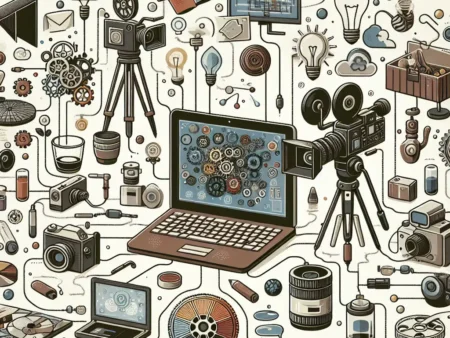Karya digital telah mengubah industri musik dengan memperluas aksesibilitas, distribusi, dan kolaborasi, serta mengubah cara pendengar mengonsumsi musik.
Bagaimana Karya Digital Mempengaruhi Industri Musik?
-
Table of Contents
- Introduction
- The Rise of Digital Platforms
- Streaming Services
- Social Media and Online Promotion
- Democratization of Music Production
- Home Recording Studios
- Virtual Instruments and Sample Libraries
- Challenges Faced by Artists and Industry Professionals
- Piracy and Copyright Infringement
- Monetization and Fair Compensation
- Summary
Introduction

The digital revolution has had a profound impact on various industries, and the music industry is no exception. In Indonesia, the rise of digital technology has transformed the way music is created, distributed, and consumed. This article explores the ways in which digital works have influenced the music industry in Indonesia, from the emergence of new platforms to the democratization of music production and the challenges faced by artists and industry professionals.
The Rise of Digital Platforms
Streaming Services
One of the most significant changes brought about by digital technology is the rise of streaming services. Platforms like Spotify, Apple Music, and Joox have gained immense popularity in Indonesia, providing users with access to a vast library of music at their fingertips. This shift from physical sales to streaming has revolutionized the way people consume music, making it more convenient and accessible than ever before.
Streaming services have also opened up new opportunities for Indonesian artists to reach a global audience. With the ability to upload their music directly to these platforms, independent musicians no longer need to rely solely on record labels for distribution. This has led to a surge in the number of artists releasing their music independently, resulting in a more diverse and vibrant music scene in Indonesia.
Social Media and Online Promotion
Digital platforms have also played a crucial role in promoting Indonesian music. Social media platforms like Instagram, Twitter, and YouTube have become powerful tools for artists to connect with their fans and build a loyal following. Through these platforms, musicians can share their music videos, live performances, and behind-the-scenes content, creating a more intimate and engaging relationship with their audience.
Furthermore, online promotion has become an essential part of music marketing strategies. Artists can collaborate with influencers, create viral challenges, or run targeted ad campaigns to increase their visibility and attract new listeners. This shift towards online promotion has leveled the playing field, allowing independent artists with limited resources to compete with major labels and reach a wider audience.
Democratization of Music Production
Home Recording Studios
In the past, recording music required access to expensive recording studios and professional equipment. However, digital technology has democratized music production, allowing artists to create high-quality recordings from the comfort of their own homes. With affordable recording software and hardware, musicians can now produce studio-quality tracks without the need for a large budget.
This has empowered Indonesian artists to experiment with different genres and styles, as they no longer need to rely on traditional recording studios to bring their creative visions to life. The ability to record at home has also given rise to a DIY (do-it-yourself) culture, where artists have greater control over their music and can release it on their own terms.
Virtual Instruments and Sample Libraries
Digital technology has also revolutionized the way musicians create music. Virtual instruments and sample libraries have become increasingly sophisticated, offering a wide range of sounds and textures that were previously only available through physical instruments. This has opened up new possibilities for Indonesian artists, allowing them to explore different genres and experiment with unique sounds.
Moreover, the accessibility of virtual instruments and sample libraries has reduced the barriers to entry for aspiring musicians. In the past, learning to play a physical instrument required time, money, and dedication. However, with virtual instruments, anyone with a computer can start creating music without the need for extensive training. This has led to a surge in the number of aspiring musicians in Indonesia, contributing to the growth and diversification of the music industry.
Challenges Faced by Artists and Industry Professionals
While digital technology has brought numerous benefits to the music industry in Indonesia, it has also presented several challenges for artists and industry professionals.
Piracy and Copyright Infringement
One of the biggest challenges faced by musicians in the digital age is piracy and copyright infringement. With the ease of sharing and downloading music online, unauthorized distribution of copyrighted material has become rampant. This has resulted in significant financial losses for artists and record labels, making it harder for them to sustain their careers and invest in new projects.
Efforts have been made to combat piracy, such as the implementation of stricter copyright laws and the development of digital rights management systems. However, piracy remains a persistent issue in Indonesia, requiring ongoing efforts to educate the public about the importance of supporting artists by purchasing their music legally.
Monetization and Fair Compensation
While streaming services have provided artists with a new avenue for reaching their audience, they have also raised concerns about fair compensation. The revenue generated from streaming is often significantly lower compared to traditional album sales or live performances. This has led to debates about the fairness of royalty rates and the sustainability of the streaming model for artists, particularly independent musicians who rely heavily on streaming income.
Furthermore, the abundance of free music available online has conditioned listeners to expect music to be readily accessible without paying for it. This has made it challenging for artists to monetize their work and generate a sustainable income solely from music sales. Many artists have had to diversify their revenue streams by exploring other avenues such as merchandise sales, brand partnerships, and live performances.
Summary
The digital revolution has had a profound impact on the music industry in Indonesia. The rise of digital platforms, such as streaming services and social media, has transformed the way music is distributed and promoted. It has provided Indonesian artists with new opportunities to reach a global audience and connect with their fans on a more personal level.
Moreover, digital technology has democratized music production, allowing artists to create high-quality recordings from home and explore new genres and sounds. This has led to a more diverse and vibrant music scene in Indonesia, with a surge in the number of independent artists releasing their music.
However, the digital age has also presented challenges for artists and industry professionals. Piracy and copyright infringement remain significant issues, impacting the financial sustainability of musicians. Additionally, the monetization of music in the streaming era has raised concerns about fair compensation and the viability of a solely streaming-based revenue model.
Overall, the digital revolution has brought both opportunities and challenges to the music industry in Indonesia. As technology continues to evolve, it is crucial for artists, industry professionals, and policymakers to adapt and find innovative solutions to ensure the continued growth and success of Indonesian music.







